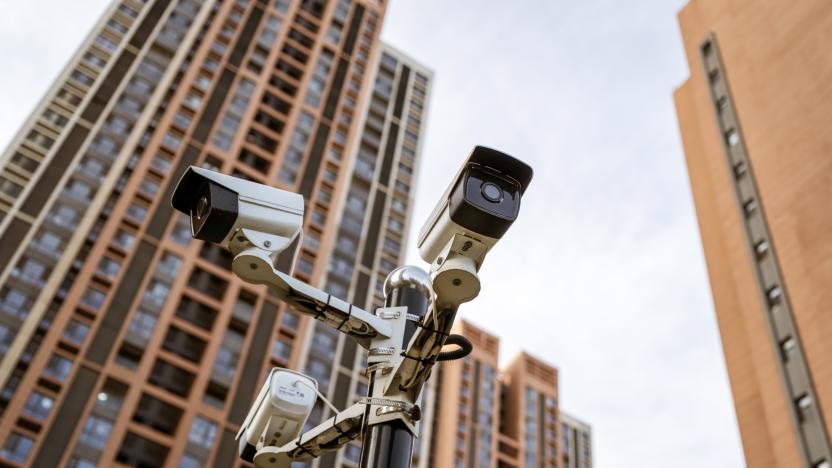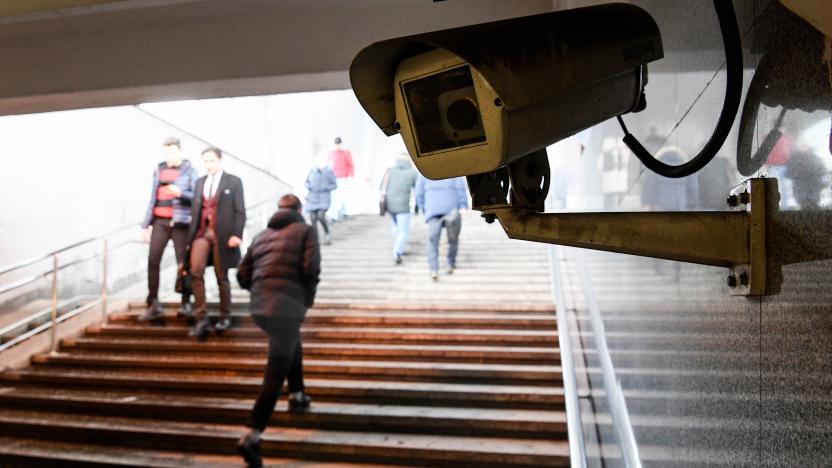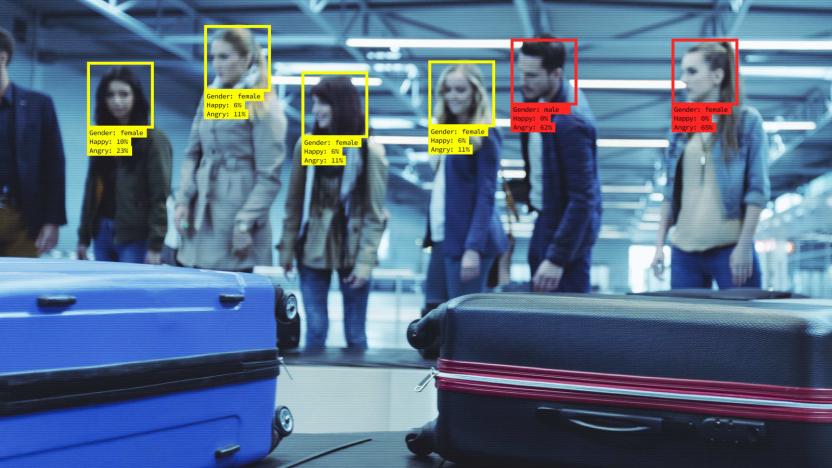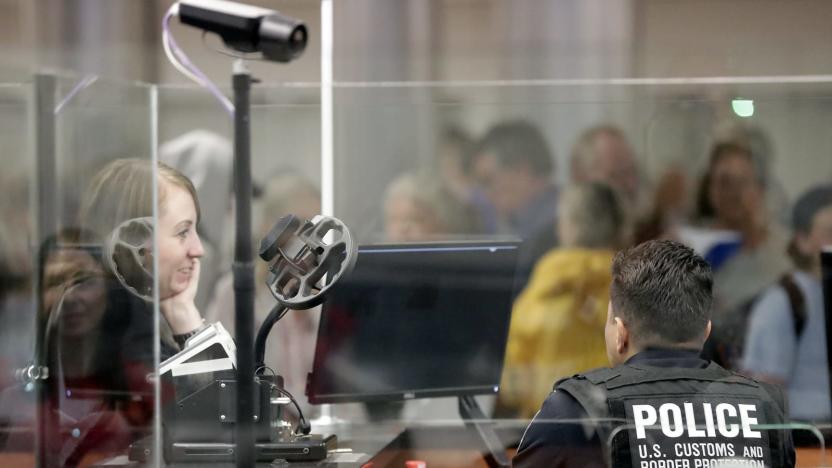immigration and customs enforcement
Latest

ICE 'now operates as a domestic surveillance agency,' think tank says
A study by the Center on Privacy and Technology found that ICE uses data brokers to avoid restrictions.

Clearview AI wins an ICE contract as it prepares to defend itself in court
It's the sort of scenario privacy advocates feared when the public learned about Clearview.

ACLU sues Homeland Security over airport facial recognition records
There's no question that AI surveillance is on the rise, but there are a lot of questions about just how extensively law enforcement agencies, like the Department of Homeland Security (DHS), are using it. In an attempt to increase transparency, the American Civil Liberties Union (ACLU) is suing DHS -- along with Customs and Border Protection (CBP), Immigration and Customs Enforcement (ICE) and the Transportation Security Administration (TSA). The ACLU is requesting records on the use of face surveillance at airports and borders, as well as the agencies' plans for future use.

Federal agencies reportedly bought phone location data to track immigrants
Since at least 2017, the US federal government has been buying commercially-available cellphone location data to aid in immigration and border-related enforcement actions, according to a report from The Wall Street Journal. The data is the type of anonymized location information that analytics firms typically sell to digital advertisers so that they target specific consumers. In other words, it's information most people consent to sharing every time they install a new app on their phone.

Federal judge rules suspicionless device searches at the border are illegal
Civil liberties advocates just scored an important victory in a bid to prevent arbitrary device searches at the US border. A federal court handling a 2017 lawsuit has ruled that US policies allowing device searches without valid suspicion or warrants violate Fourth Amendment protections against unreasonable searches and seizures. Judge Denise Casper noted that an exemption for searches at the border was "not limitless," and still needed to strike a balance between privacy and government interests. That usually means focusing on contraband, she said.

DoJ pushes Google and Apple to ID 10,000 users of a gun scope app
The US government has reportedly ordered Apple and Google to hand over the names, phone numbers and IP addresses of at least 10,000 users of a gun scope app. The data request is part of an investigation into weapons export violations, but it has privacy experts understandably concerned. According to Forbes, this is the first known case of US investigators demanding personal data from users of a single app from Apple and Google.

Senators propose legislation to protect your phone at the border
For years, US border agents have been demanding access to digital devices as people pass into and out of the country. The practice has raised red flags and lawsuits, and the number of searches has spiked under the Trump Administration. Last month, the ACLU charged federal agents with wielding "near-unfettered authority" to search phones, PCs and other devices. Yesterday, Senators Ron Wyden (D-OR) and Rand Paul (R-KY) introduced a bill that would require agents to obtain a warrant or written consent before they crack open digital devices and snag users' data.

ACLU: border agents regularly perform 'warrantless' device searches
Privacy advocates have long been concerned that US border agents may be overstepping their boundaries when searching devices, and the ACLU just obtained evidence appearing to support that theory. The civil rights group has motioned for summary judgment in its lawsuit against the Department of Homeland Security after its discovery process revealed far-reaching policies for "warrantless and suspicionless" searches. Reportedly, both Customs and Border Protection as well as Immigration and Customs Enforcement have claimed "near-unfettered authority" to search phones, PCs and other devices, even though the requests fall well outside their purview.

Dozens of law enforcement agencies are helping ICE track cars
More than 9,200 Immigration and Customs Enforcement employees have access to a license plate database that allows authorities to track the movement of vehicles over time. The American Civil Liberties Union says more than 80 law enforcement agencies across several states are sharing license plate details with ICE, which purportedly doesn't have sufficient safeguards to prevent abuse.

Following the TSA's lead, the NTSB drops Blackberry for iPhone
According to a report in the Wall Street Journal, the National Transportation Safety Board, or NTSB, may join the growing number of government agencies that plan to ditch the BlackBerry in favor of the iPhone. A notice posted on the Federal Business Opportunities website announces that the NTSB is working with Verizon Wireless to supply iPhone 5 handsets to the agency. In a PDF justification for the "sole source" declaration regarding Verizon and the iPhone 5, the NTSB says that the agency "requires effective, reliable and stable communication capabilities to carry out its primary investigative mission and to ensure employee safety in remote locations." The agency pointed out that BlackBerry handsets "have been failing both at inopportune times and at an unacceptable rate." The NTSB noted that iPhones are the best solution going forward as they are compatible with the agency's fleet of iPads and can be supported by the existing IT and messaging infrastructure in place there. The NTSB is getting a substantial discount on the iPhone 5 handsets in consideration of the expenditures already incurred to buy BlackBerry units from the carrier. This isn't the first government group to drop the BlackBerry. Earlier this year, the Defense Department announced it was accepting proposals for an iOS or Android-based software security system for mobile devices. This contract could eventually support up to 8 million devices, says a report in USA Today. The Immigration and Customs Enforcement confirmed in September that it would switch its 17,676 mobile users to the iPhone because the BlackBerry could "no longer meet the mobile technology needs of the agency"; the Bureau of Alcohol, Tobacco and Firearms made a similar move earlier in 2012. The Transportation Security Administration also announced in May that it would drop both BlackBerry and Windows mobile devices and replace them with Apple products in a deal worth $3 million. Despite these setbacks, beleaguered RIM says it still has "1 million government customers in North America alone who depend on BlackBerry, and more than 400,000 government customers worldwide upgraded their devices in the past year." [Via WSJ and USA Today]

US Immigration and Customs Enforcement drop Blackberry for iPhone, employees get early Christmas bonus
RIM may be banking on the release of BB10 and new devices to rejuvenate the flagging brand, but the US Immigration and Customs Enforcement agency (ICE) isn't waiting around, opting to end their contract after eight years together. ICE stated that RIM "can no longer meet the mobile technology needs of the agency," and that it intends to purchase over 17,000 iPhones for its personnel at a cost of $2.1 million. Android was also interviewed for the role, but the agency decided that currently, Apple's closed ecosystem was the best choice, offering "reliable, mobile technology on a secure and manageable platform." While this isn't the first group (or likely, the last) to drop the Blackberry, we're wondering if the remaining million government customers in North America will stay loyal after this official stamp of disapproval. We imagine employees from other agencies might also care to make a case for switching -- nothing to do with free iPhones, of course.

Federal domain seizure raises new concerns over online censorship
It's been a little more than a year since the US government began seizing domains of music blogs, torrent meta-trackers and sports streaming sites. The copyright infringement investigation, led by US Immigrations and Customs Enforcement (ICE) authorities, quickly raised eyebrows among many free speech and civil rights advocates, fueling a handful of legal challenges. Few are more compelling, or frightening than a case involving Dajaz1.com. As TechDirt reports, the popular hip-hop blog has been at the epicenter of a sinuous and seemingly dystopian dispute with the feds -- one that underscores the heightening controversy surrounding federal web regulation, and blurs the constitutional divide between free speech and intellectual property protection. Dajaz1 was initially seized under the 2008 Pro IP Act, on the strength of an affidavit that cited several published songs as evidence of copyright infringement. As it turns out, ,any of these songs were actually provided by their copyright holders themselves, but that didn't stop the government from seizing the URL anyway, and plastering a warning all over its homepage. Typically, this kind of action would be the first phase of a two-step process. Once a property is seized, US law dictates that the government has 60 days to notify its owner, who can then choose to file a request for its return. If the suspect chooses to file this request within a 35-day window, the feds must then undertake a so-called forfeiture process within 90 days. Failure to do so would require the government to return the property to its rightful owner. But that's not exactly how things played out in the case of Dajaz1. For more details on the saga, head past the break.

US judge won't return seized URL to Rojadirecta.com, absolutamente no
Welcome to the homepage of popular sports streaming and p2p site Rojadirecta.com. Why all the birdy logos and harsh words about going to prison? Well, it's a convoluted story, which began when a whole bunch of sports sites -- including Rojadirecta -- were summarily seized by US Immigration and Customs Enforcement, based on "probable cause to believe" they'd been involved in copyright infringement. Awkwardly, the Spanish owners of this particular site had already been cleared of any wrongdoing by courts in Spain, but this counted for nada because their .com URL was American. So, their one hope was to convince a US judge that the seizure violated the First Amendment and should be overturned. This case won support from freedom of speech activists like the Electronic Frontier Foundation, but on Thursday it finally failed. The presiding judge ruled that no rights had been violated, because Rojadirecta could easily set up shop at a non-US address and continue to function. Bad news indeed for the Spaniards -- maybe they should move to the UK, where due process takes a whole lot longer.

US government seizes domain names, claims to have a warrant
We're all for bashing botnets, but the US Immigrations and Customs Enforcement (ICE) may have crossed a line -- in the midst of nabbing counterfeiters this weekend, the government organization seized the domains of a torrent meta-tracker and a trio of music sites. Today, the picture above is the only thing you'll see if you go to Torrent-Finder.com, RapGodFathers.com, Dajaz1.com or OnSmash.com, as the ICANN domain registration for the four are now in the ICE's possession, presumably on suspicion of piracy. If you ask the original domain owners however, they'll vehemently refute such allegations -- the torrent site reportedly didn't even distribute torrents themselves, merely cross-referenced other sites that do, and a RapGodFathers representative told TorrentFreak that it had complied with all DMCA takedown notifications. Apparently the websites and servers themselves are still intact, and it's only the URLs at stake, as two of the four websites are already up and running at domains ending in .info. We have to admit, this particular brand of domain squatting could be an intriguing business model. Expect "seized domains" to be tacked onto the laundry list of "Valuable Items You Too Can Buy at Government Auction!" any day now. [Thanks, Brian]

Console hacker arrested, faces up to ten years in jail
Just when you thought it was safe to get out your soldering irons, Immigration and Customs Enforcement wants you to know that its agents are still out there, on the lookout for for even more mod chip-wielding nogoodniks and their non-DMCA compliant consoles. According to the AP, a 27-year-old CSU student named Matthew Crippen was recently arrested for "modifying Xbox, PlayStation and Wii consoles in violation of the Digital Millennium Copyright Act" and released Monday on $5,000 bond. The dime was dropped on this perp by the Entertainment Software Association, and the raid conducted by Customs agents sometime in May. He will be arraigned on August 10th, and if convicted, he faces up to 10 years in prison. Let this be a lesson to you: while the ICE may have its hands full with human slavery, drug trafficking, transnational gangs, and stolen artifacts, there is always time to make an example out of a man that knows his way around the inside of a Playstation.







